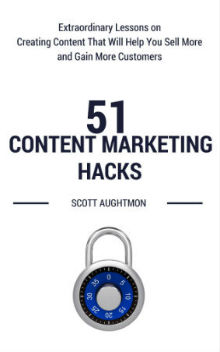I’ll continue my series about the power of serialization and suspense as a content marketing strategy next week.
If you haven’t read any of the previous lessons yet, then check out the first two installments of the series:
PART 1: How Content Marketers Can Use a Literary Technique That Made Charles Dickens Famous
PART 2: How to Create Content That Will Hold People’s Attention and Keep Them Reading
In the meantime, I thought you’d like to hear an amazing story of how content marketing took one woman on a journey from a Silicon Valley worker to the owner of a Michelin-rated restaurant.
The most surprising fact? How inexperienced she was as a chef.
She told SFGate.com… “I learned to cook when I first tasted what passed for Thai food here in the States. Before that, I couldn’t even boil an egg.”
I’ll tell you her story and after that I’ll reveal some lessons we can learn from her (and even how I think she tapped into the power of serialization in a subtle way).
But first, listen to her amazing story…
An Educated Woman’s Surprising and Courageous Decision
Pim grew up in Bangkok.
But, in her words, she was “shipped off to study in other places”. Her studies involved a large variety of things such as cognitive science, communications, and ethnomethodology.
She eventually found herself living in the San Francisco Bay Area. And you’re not going to believe this, but after all of the education she received, she discovered that her real passion was food.
That’s why in 2005 she took an unbelievable risk. She quit her Silicon Valley job to pursue a career in food.
But what kind of career in food can someone who is not a skilled chef have? She decided to start a food blog she called chezpim.com, where she would write about her visits to some of the world’s best restaurants.
So she began creating content: writing, reporting, and taking photos about her love: food.
On her blog she chronicled what she told FoodandWine.com was, “culinary adventures from street stalls around Southeast Asia to my longtime favorite Michelin three-star, L’Arpège in Paris.”
The Unbelievable Results of Content
In was through this blog that she became one the early food bloggers to gain widespread praise for her blog. She ended up accumulating more than 142,000 regular readers who signed up for daily recipes, restaurant reviews and to hear her opinions on food.
Her recipes, writings, and photographs ended up appearing in the New York Times, Food & Wine Magazine, Bon Appétit magazine, and more.
One other surprising thing came from her blog: she met her longtime partner, David Kinch, who is the chef-owner of Manresa in Los Gatos. (It was through a comment on her blog that their relationship began.)
In 2009, Pim published first (and I believe only) book The Foodie Handbook: The (Almost) Definitive Guide to Gastronomy.
You can see her trailer for the book here…
From Food Blogger to Restaurant Owner
In the spring of 2014, Pim took a huge leap. She opened her own restaurant, Kin Khao in San Francisco, whose mission was in her words to “liberate” Thai cuisine from “the tyranny of peanut sauce.”
What was her inspiration?
She couldn’t find any good food like she ate in Bangkok.
That inspired her to begin learning the recipes for her favorite dishes by calling her relatives back home and on her annual trips back to Thailand.
And that leads to the most amazing part of this whole story…
The Michelin Rating
This year, Kin Khao received the highest praise: a 1-star Michelin rating. (1 star: Very good food). This is the rating from the MICHELIN Guide:
Don’t let its covert location fool you-Kin Khao is a flagrantly delicious and very distinctive dining room. The décor is unexceptional by no uncertain terms, but really nobody seems to care, as the cooking-punctuated by Californian elements and welcome seasonality-is the real deal. Northern Thai is what this kitchen is all about and pad Thai-loving palates should vacate these premises…pronto. Of course, the unique menu reads like a veritable thesis on Isaan food mingled with California love. Then there’s the easygoing and chill staff who never miss a beat-as they bestow tables with vibrant, product-driven plates. These have included crispy lima beans tossed in nam tok followed by crunchy albeit not as “hot” chicken wings massaged with tamarind and chili. Pork meatballs seasoned with garlic and lemongrass (laab tod) are enriched by a phenomenal chili (jaew) sauce; while a gorgeous platter of crunchy vegetables is accompanied by a jar of the incredible nam prik (potent with shrimp paste) layered with caramelized pork jowl, fried catfish, and a salted duck egg. Panang curry with tender-braised duck is a champ among palates less valiant. Closing arguments may reveal that this is a truly Thai kitchen turning out insanely memorable food. All objections overruled.
4 Content Marketing Lessons We Can Learn from Pim
Pim is obviously a naturally skilled chef. And I am sure her relationship with David Kinch (whose restaurant also received a Michelin rating) didn’t hurt.
But you need to remember how this all began with content. It didn’t begin with cooking lessons. It began with her creating content based on what she loved.
There are many lessons we can learn from Pim, but here are four important content marketing lessons that I thought I’d point out:
- Get started. Sitting around thinking about creating content doesn’t impact your life like action does.
- Use a variety of content. She posted recipes, reviews, pictures, etc. Don’t get stuck one main form of content.
- Interact with your fans. That’s how she met David! You never know what connections you can make when you interact with your audience on your blog, on social media, etc.
- Use content to establish your authority in the market. She wrote articles for top magazine and eventually wrote her own book. These things elevated her in her niche and helped her blog to reach the #6 slot on a “50 0f the Best Blogs in the World” list.
And how did she use serialization and suspense?
I think she did this by constantly posting up new restaurants that she visited around the world. This made her audience want to come back to see the latest restaurant she had been too!
Pim’s story is a powerful example of content marketing.
Next time you’re wondering Can this content marketing stuff really help?… remember her story.
Sources: SFGate.com, ChezPim.com, WSJ.com, and FoodandWine.com
Stay Tuned…
Don’t forget!
In my next post, I’ll share the little-known story of how the best-selling novel of the 19th century (the second best-selling book of that century, following the Bible) actually began as a series or articles in a newspaper.
Not only that, I’ll share with you some powerful, modern-day case studies that reveal the power of serialization.
I’ll also show you some important lessons we can learn from them.
Stay tuned!
If You Liked This Post…
If you liked this post, then you might want to:
- Subscribe to this blog, so you don’t miss the next post!
- Read my last post about “How to Create Content That Will Hold People’s Attention and Keep Them Reading“
- Check out my latest LinkedIn post: The Content Strategy that Made Justin Bieber a Star
- Read my book: 51 Content Marketing Hacks
- Hire me to help you implement suspenseful, content serialization into your content marketing
- Hire me to come speak about this topic (or another topic)
- Learn why your content marketing isn’t working here
- Share this post with your friends and followers
- Or ALL OF THE ABOVE!







